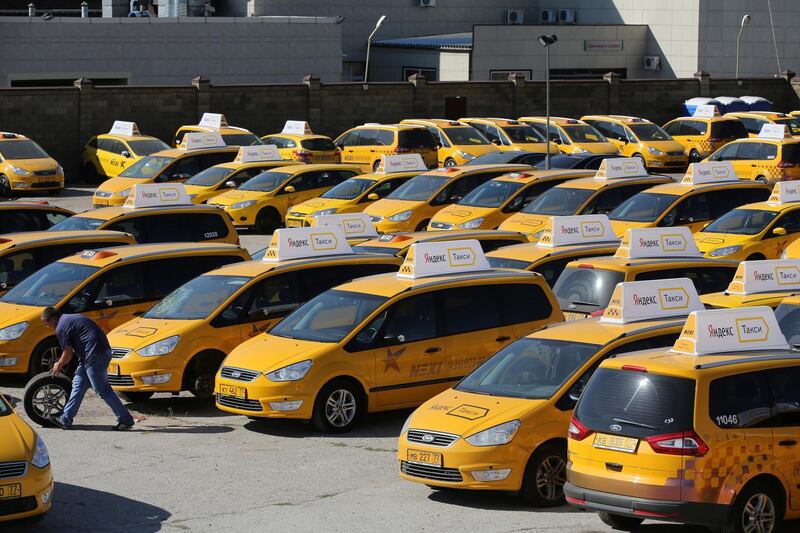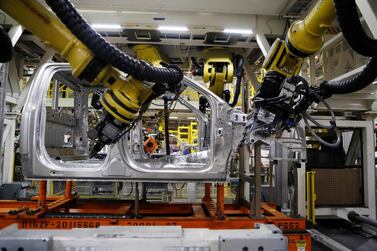When Evgeny Barkov owned a car, the 31-year-old software salesman would often look out of his Moscow window at it with disgust.
His possession sat unused more than 90 percent of time, while sucking up money and causing him anxiety that it might break down.
He finally took out a calculator, added up all the costs and determined he was better off selling his grey Peugeot and switching completely to car-sharing services such as Yandex Drive, which offers cars ranging from basic Kia models to flashy Porsches.
“That investment brought me nothing but trouble,” said Mr Barkov as he wound through Moscow’s snowy streets in a white Skoda saloon with a bright yellow stripe on the side and Yandex’s software on the dashboard console. “Now, I’m just paying for using.”
The venture - set up last year by a local Internet company - flooded the Russian capital with more than 7,000 cars to rent for as little as 5 roubles (29 fils) per minute, including fuel, maintenance and parking. That compares to 41 cents a minute for Daimler’s Car2Go in New York and is an offer too good to pass up for a growing number of Muscovites.
Yandex is Russia’s version of Google and has taken advantage of its strategic position at the centre of the digital economy to deepen ties with consumers through services ranging from shopping sites to music streaming. The company began its push into transport services with cab-hailing app Yandex Taxi in 2011, now Russia’s largest. It controls Uber Technologies' business in the region.
Almost out of nowhere, car-sharing in Moscow has boomed, with the number of vehicles more than tripling last year. The city now has the biggest shared fleet in Europe and the second-largest in the world. The rapid shift spells trouble for car makers by providing a blueprint for how a deep-pocketed technology player can move quickly to woo consumers with alternatives to traditional car ownership.
“We’re approaching a point that could flip the entire car market on its head,” said Shwetha Surender, a London-based analyst with consultancy Frost & Sullivan. “Car makers risk becoming mere suppliers to shared mobility services and losing direct relations with customers. That’s an unattractive proposition.”
To be sure, car makers are seeking to head off the risk. Daimler and BMW merged their car-sharing ventures to gain greater scale. Volkswagen is testing its MOIA ride-sharing service in Hamburg, while General Motors has invested in Lyft.
They all somehow missed Russia’s biggest city, with more than 12 million people. Daimler’s Car2Go, BMW’s DriveNow and Avis Budget Group’s Zipcar are all no-shows, even though its notoriously clogged streets - Moscow is ranked as the world’s second-worst city for traffic congestion - were ripe for disruption and authorities were practically begging car-sharing companies to invest.
Paid parking was introduced in the city centre in 2013 and is generally booked via app - training residents to use smartphone features for their transport needs. A day’s worth of curbside parking could cost about $30, making it the largest daily expense for many Russian drivers. Car-sharing providers get discounted rates of about $400 a year.
Yandex took advantage, swarming Moscow streets last year with vehicles such as Renault Captur crossovers, BMW 5-Series saloons and even Porsche 911 sports cars. Its aggressive investment made it the market leader ahead of local rivals Delimobil and BelkaCar.
At the end of 2018, there were 16,500 car-sharing vehicles in the city, and Moscow’s Transportation Department expects the number to rise by 5,000 vehicles annually in the coming years. The fleet expansion trailed a boom in users as rides more than quadrupled to 23 million.
“Russia started car-sharing later than other countries, but due to this we were able to deploy the latest technologies,” said Anton Ryazanov, head of Yandex Drive, which expanded to St Petersburg in December. “Now, the Russian market is taken by local car-sharing firms, and the entrance of large international players is unlikely.”
But motor manufacturers can get in on the changing face of car ownership. Car-sharing is the next step in eventually offering a robo-taxi service - the goal of Alphabet’s Waymo, according to Bloomberg. Waymo is in advanced talks to develop autonomous cars with Renault, Nissan Motor and Mitsubishi Motors, according to sources, in a move that would join a leading self-driving force with the world’s largest automotive alliance.
A deal between the three car makers and Alphabet's self-driving unit could include making driverless taxis, said one source. An agreement could be reached as soon as spring, Nikkei reported earlier.
Waymo has previously announced deals with Fiat Chrysler Automobiles and Tata Motors’ Jaguar Land Rover. A tie-up with the French-Japanese alliance would be its biggest yet, adding partners who together churn out millions of cars a year - on par with the biggest individual car makers, Volkswagen and Toyota.
Alliance spokesman Nicholas Twork said the report was based on rumours. Waymo declined to comment.
For Renault and Nissan, collaborating with Waymo would bring leading-edge technology just as the race to develop autonomous vehicles heats up. It would also strike a positive note for the French and Japanese manufacturers, whose two-decade partnership has been beset by tension since the arrest in November of former leader Carlos Ghosn in Japan over alleged financial improprieties.
Last month, Nissan said its board remained committed to the car maker's alliance with Renault and Mitsubishi, Reuters said, after directors met to discuss the ongoing investigation into former chairman Carlos Ghosn and ways to bolster governance.
Waymo met with more than 12 car makers in 2016 seeking manufacturing partners for its autonomous vehicle technology, according to documents revealed last month.
By starting with car-sharing, Yandex gets a pool of customers that could easily switch from driving the company’s vehicles to riding in them. The company also develops the know-how of managing and maintaining a large fleet.
“Right now, we see that use-case scenarios of taxi and car-sharing are different,” Mr Ryazanov said. “But it’s clear that in several years, when self-driving technologies become wide-spread, these two services will eventually become one. You’ll have a choice - either to sit in the backseat and the robot will drive, or sit behind the wheel yourself.”
Like most other car-sharing services, the vehicles are booked via app. Yandex’s has a “radar” function that pings users when a car becomes available nearby. Rates across Moscow’s services can increase when demand is high and vehicles are in short supply, but generally run at around 8 roubles a minute for a basic car and 16 roubles for an upscale model. The costs are noticeably lower than in the US and Europe mainly because of cheaper labour, maintenance and fuel.
There are also key advantages for car-sharing users like Barkov. Once a vehicle is booked, it can be pre-heated - a useful feature during Russia’s frigid winters.
When he had his own car, Mr Barkov recalled the nagging feeling of wanting to upgrade to a nicer, more expensive model. But now he enjoys the variety of driving a Russian Lada one day and a Mercedes-Benz the next.
“I only use cars for utilitarian reasons,” said Mr Barkov.
“There’s no difference for me driving a car with a cheap interior or one with all leather.”







